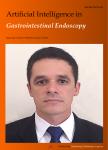Artificial intelligence as a means to improve recognition of gastrointestinal angiodysplasia in video capsule endoscopy
作者机构:Department of MedicineLoma Linda University Medical CenterLoma LindaCA 92354United States Gastroenterology SectionVA Loma Linda Healthcare SystemLoma LindaCA 92357United States Division of Gastroenterology and HepatologyAugusta University-Medical College of GeorgiaAugustaGA 30912United States
出 版 物:《Artificial Intelligence in Gastrointestinal Endoscopy》 (胃肠道内窥镜检查中的人工智能(英文))
年 卷 期:2021年第2卷第4期
页 面:179-184页
学科分类:1002[医学-临床医学] 100201[医学-内科学(含:心血管病、血液病、呼吸系病、消化系病、内分泌与代谢病、肾病、风湿病、传染病)] 10[医学]
主 题:Artificial intelligence Video capsule endoscopy Gastrointestinal angiodysplasia Detection Bleeding Small bowel
摘 要:Gastrointestinal angiodysplasia(GIAD)is defined as the pathological process where blood vessels,typically venules and capillaries,become engorged,tortuous and thin walled–which then form arteriovenous connections within the mucosal and submucosal layers of the gastrointestinal *** are a significant cause of gastrointestinal bleeding and are the main cause for suspected small bowel *** make the diagnosis,gastroenterologists rely on the use of video capsule endoscopy(VCE)to“target***,the use of VCE can be cumbersome secondary to reader fatigue,suboptimal preparation,and difficulty in distinguishing *** human eye is *** same capsule study read by two different readers are noted to have miss rates like other forms of *** intelligence(AI)has been a means to bridge the gap between human imperfection and recognition of *** use of AI in VCE have shown that detection has improved,however the other burdens and limitations still need to be *** use of AI for the diagnosis of GIAD shows promise and the changes needed to enhance the current practice of VCE are near.



